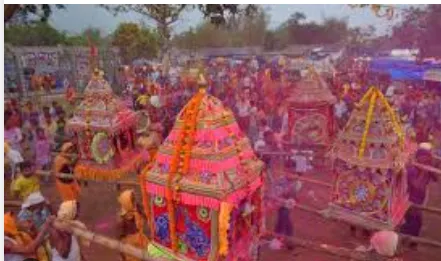

Bhubaneswar, February 28: As major festivals approach across the seven districts of Central Range, Cuttack, the region's police forces are ramping up their preparedness to ensure peaceful and secure celebrations, stated Dr. Satyajit Naik, Inspector General of Police (IGP) for Central Range, Cuttack.
Dr. Naik conducted a comprehensive review of law and order measures in anticipation of the festive season, which will see a range of significant celebrations. Central Range, comprising Cuttack, Puri, Khurda, Nayagarh, Jagatsinghpur, Jajpur, and Kendrapara, will be hosting numerous events over the next few weeks. The IGP virtually met with the Superintendents of Police (SPs) of these districts to assess their preparedness for the upcoming celebrations.
Key festivals such as Dol Purnima (March 3), Holi (March 4), Eid-ul-Fitr (March 21), Rama Navami (March 27), Hanuman Jayanti (April 14), and Maha Vishuba Sankranti are expected to draw large crowds in both urban and rural areas. With this in mind, Dr. Naik emphasized the importance of prioritizing public safety and maintaining communal harmony.
Dr. Naik outlined a detailed security strategy, particularly for sensitive areas and religious procession routes. The district police forces have been instructed to increase patrolling, strengthen vehicle checks, and intensify surveillance in vulnerable regions. Additional force deployment will be ensured during foot processions and motorcycle rallies to prevent any potential disruptions. Special attention will be given to deploying lifeguards at Puri Sea Beach and other key water bodies to ensure the safety of devotees.
In light of the growing influence of social media, the IGP also stressed the importance of continuous monitoring of digital platforms to combat the spread of rumors, misinformation, and inflammatory content. Cyber cells in the districts have been tasked with staying alert and swiftly addressing any attempts to disturb communal peace.
Moreover, Dr. Naik advised district SPs to bolster intelligence gathering, ensure the installation and effective functioning of CCTV cameras at critical urban locations, and maintain fully operational Command and Control Centres. Revitalizing peace committees by engaging with community leaders and public representatives was also highlighted. Coordination with Civil Administration, Fire Services, and Health departments will be key to ensuring smooth festivities.
On traffic management, Dr. Naik emphasized the strict enforcement of traffic regulations under the "Operation Jeevan Suraksha" initiative, targeting drunk driving and controlling noise pollution from DJs during the festivals. Proactive steps against habitual offenders and troublemakers will also be a focus.
In closing, Dr. Naik reiterated the need for heightened vigilance and readiness among all district police officers. With coordinated efforts, Odisha Police is committed to ensuring that the upcoming festivals are celebrated in a secure, peaceful, and harmonious environment.